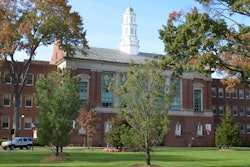WASHINGTON – Wes Moore recalled coming home during a break in school from Valley Forge Military Academy in Pennsylvania and tussled with friends who teased him for leaving his West Baltimore neighborhood.
After Moore expressed his frustration about the incident to his uncle, his elder relative gave him a simple message: “It’s not that you changed. They haven’t.”
Today, Moore is a 31-year-old author and entrepreneur who earned a bachelor’s degree in International Relations at Johns Hopkins University, and earned a master’s at Oxford University as a Rhodes Scholar. He was a featured speaker at the 2008 Democratic National Convention. He also is a decorated war veteran for military service in Afghanistan.
Moore told part of his life story during a discussion Thursday night at the Open Society Foundations (OSF) office in downtown Washington. OSF co-hosted the event with the American Constitution Society for Law and Policy and Center for American Progress.
The evening’s highlight was Moore’s book, The Other Wes Moore: One Name, Two Fates, which focuses on how Moore shares the same name with a man close in age who is spending the rest of his life in a Maryland prison.
The 75-minute discussion featured Moore and questions from National Public Radio’s Michel Martin about education, juvenile justice system, poverty and race before a crowd of more than 100 policy professionals, including elected officials and law professors.
Moore said his mother, who was in attendance, explained how police “wanted” posters seeking “Wes Moore” were plastered throughout the city. According to the book, Moore the prisoner was involved in a botched jewelry store robbery with his older brother in 2000 that resulted in an off-duty Baltimore police officer being shot and killed.
Gritty details in the book are highlighted in chapter seven, “The Land That God Forgot.” Readers learn that Moore the prisoner became so frustrated with making less than $10 an hour that he cooked nine ounces of crack cocaine in his apartment to obtain thousands of dollars from the street.
Because the book never mentions why Moore the scholar wanted to communicate with Moore the prisoner, Martin asked the author to explain.
Besides the uniqueness of having the same name, Moore said his passion for education and improving the juvenile justice system motivated him to seek out the prisoner.
Moore the scholar wrote a letter to Moore the prisoner and received a response one month later. For the past several years, both men communicated with each other through letters, phone calls and Moore visiting his namesake in prison.
Moore mentioned how they share similar life stories: both were raised in a single-parent household with their mothers, both were in trouble with the police as teenagers and both hung out on the same street corners in West Baltimore.
But Moore the prisoner fathered his first child at age 15 and had a couple more children with different women. Moore and his wife are expecting their first child in a few months.
“The book is about a societal conversation. The book is about the word other,” Moore said. “Our society will be treated [on] how we treat the have nots.”
Several people applauded Moore for telling his story, including U.S. Rep. Robert C. “Bobby” Scott, D-Virginia, who is working on legislation to reintroduce the Youth Promise Act. The legislation emphasizes educational programs rather than on incarcerating non-violent offenders, according to Scott.
“Your story puts real meat to the story,” Scott said while pointing to Moore. “We end up spending more money on the other Wes Moore. This Wes Moore is cheaper to produce.”
Moore said it costs $75,000 annually to house his namesake and the amount increases if he gets sick. He added prison officials look at third-grade reading level tests scores to project how many beds would be needed at a future prison.
Nkechi Taifa, a senior policy analyst with the Open Society, said Moore’s human interest story was a unique shift from the normal policy and advocacy meetings she normally attends in Washington.
“Our main goal was to expose [Moore] to a Washington policy audience. A lot of these advocacy groups don’t get to hear these human element type stories. It was absolutely refreshing,” she said after the discussion. “Wes Moore is reality. He connects to everyone. He is willing to help the world.”


















